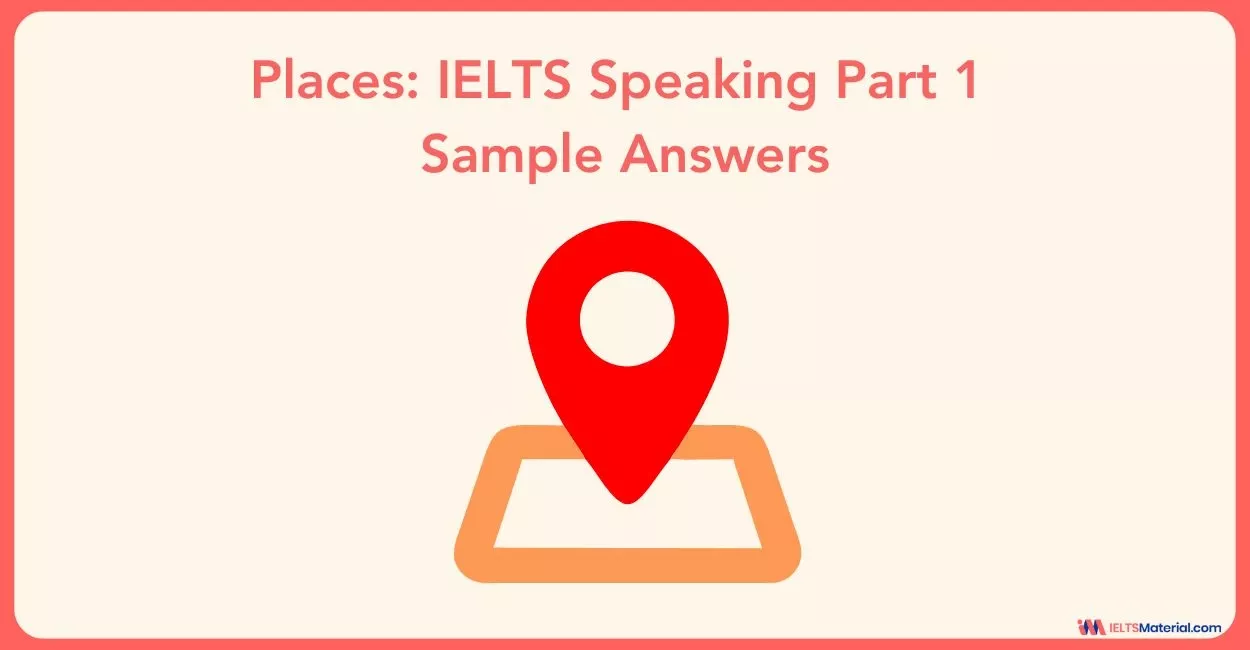Places: IELTS Speaking Part 1 Sample Answers
3 min read
Updated On
-
Copy link
Want to score a Band 8+ in IELTS Speaking? Practice with real Part 1 questions on Places and their sample Answers to enhance your performance by looking at the tips while increasing your score!
Table of Contents

Limited-Time Offer : Access a FREE 10-Day IELTS Study Plan!
Since personal choices and opinions are important for the Speaking test’s Part 1, it is important to prepare common and relatable topics, like ‘Places IELTS Speaking Part 1.’ Here, you will be asked simple, personal questions about where you live, your preferences, and your daily routines.
This topic gives you an excellent chance to express opinions, describe different locations, and use vivid vocabulary. Let us now take a look at some sample responses related to this topic on the Places IELTS Speaking Part 1.
Additionally, we will look at some tips and the latest IELTS speaking vocabulary to boost your score to frame your answers, and develop confidence.
Enroll in our Free IELTS Webinar and learn more about techniques to improve your speaking skills to achieve a band 8+.
Places IELTS Speaking Part 1 Questions with Sample Answers
In IELTS Speaking Part 1, you have to answer the IELTS examiner’s questions naturally and fluently. You should therefore focus on one idea and then expand it using grammar patterns and vocabulary, which can help you get Band 8.0+ for IELTS Speaking.
So, let's take a look at some sample answers to ‘Places IELTS Speaking Part 1’ questions that will help you to frame your answers and achieve a high IELTS band score.
1 Do you think cities worth visiting are also suitable to live in?
Yes, I think so. To me, cities worth visiting are places with cheap, efficient transportation, low crime rates, and a clean, healthy environment. Cities like that would be wonderful to live in.
People living in the countryside tend to be self-employed and work in farming or other jobs that involve physical labor, while those living in the city usually work for companies or organizations in jobs that focus more on mental labor.
2 What is the difference between big cities and small cities?
Big cities have more people and higher population densities; as a result, in big cities, roads are usually more crowded and there are more apartment buildings. Products and services in big cities also tend to be more expensive than in small cities.
3 What is the difference between the north and south parts of your country?
The north and the south use different dialects. We use different words, phrases, and even pronounce words differently, so I may have difficulty understanding someone from the South. Another difference between the two regions is the weather. The South is consistently hotter than the North. Rain in the south also comes in fast and rarely lasts longer than a couple of hours, while in the north, it tends to drizzle throughout the day.
4 What makes one country different from another?
Countries differ in terms of language, history, and culture. Laws and regulations are also another aspect. Traffic laws, for example, might vary from one country to another.
Places IELTS Speaking Part 1: Vocabulary
- Drizzle: light rain falling in very fine drops.
Eg: It was only a drizzle. - Self- employed: individuals, or independent contractors, earn income by contracting with a trade or business directly.
Eg: He was self- employed. - Dialects: a particular form of a language which is peculiar to a specific region or social group.
Eg: The dialect of Bengal is totally different from the south of India . - Physical labor: the labourer has to undergo a great deal of physical exertion.
Eg: Physical labour is strenuous. - Couple of hours: two hours.
Eg: There are a couple of hours left for the exam. - Efficient: achieving maximum productivity with minimum wasted effort or expense.
Eg: He is very efficient. - Mental labour: conceptualized as the planning.
Eg: Mental labour makes you tired easily.
Connect with our IELTS Experts to crack your IELTS Speaking and ace the exam with a band 8+! Book a Free Demo.
To sum up, ‘Places’ is a topic that is rich in detail, so use that to your advantage. Describe what you like, why it matters to you, and how it affects your lifestyle. Moreover, practice more IELTS Speaking Part 1 topics and questions with answers, using topic-specific vocabulary and giving relatable personal examples, and you will show fluency, coherence, and lexical range, key criteria for a high band score.
See also:

Start Preparing for IELTS: Get Your 10-Day Study Plan Today!
Recent Articles

Nehasri Ravishenbagam

Nehasri Ravishenbagam

Kasturika Samanta

Kasturika Samanta




Post your Comments